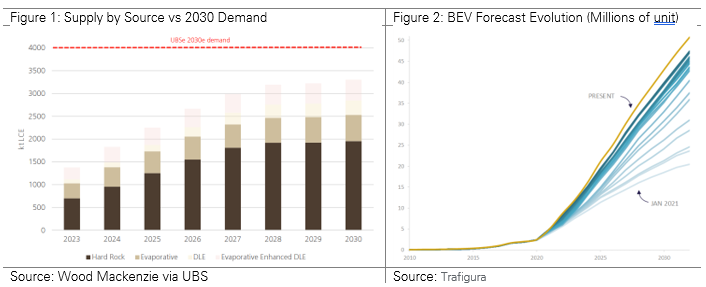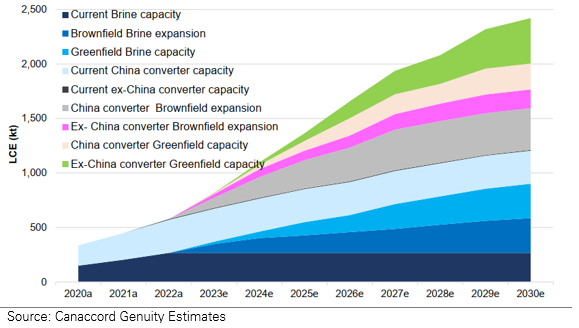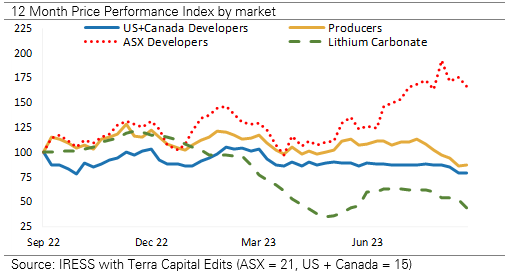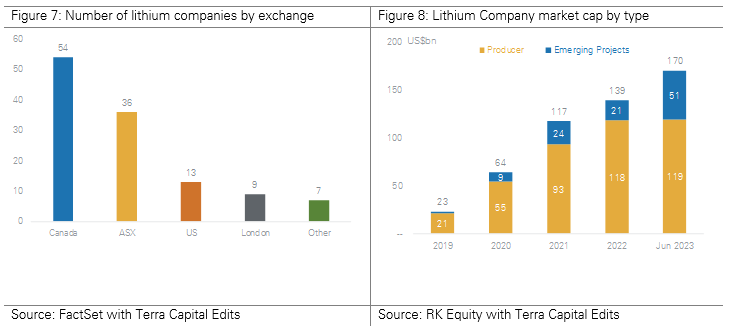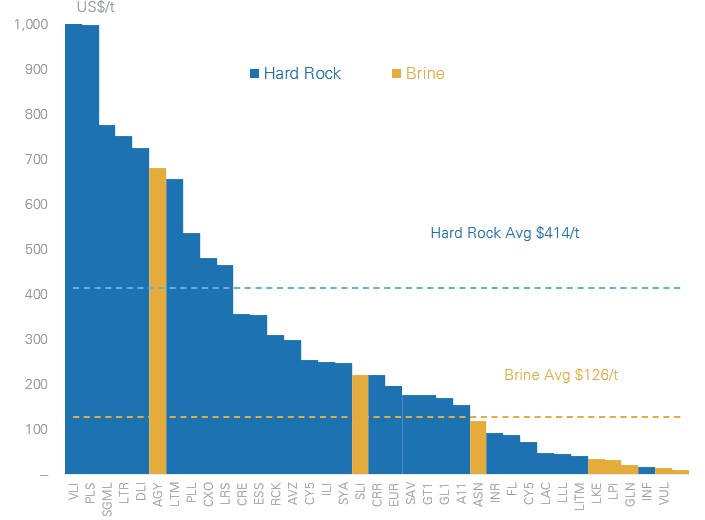Please take a moment to read these terms and conditions, which govern your use of this website.
By accessing this website you agree to be subject to the terms and conditions set out in this document and any other notices or disclaimers contained on this web site.
This website is issued by Terra Capital Holdings Pty Ltd (Terra Capital Group) and its related bodies PT Asset Management Pty Ltd ABN 24 126 654 788 AFSL 318961, Terra Capital Natural Resource Fund Pty Ltd ABN 99 608 953 868, Terra Capital Green Metals Fund Pty Ltd ABN 65 653 993 723. Unless stated otherwise, information on this web site is provided by the issuer of the applicable financial product.
The information contained on this web site is believed to be accurate and current at the time of compilation and is provided in good faith. Terra Capital Group does not accept any responsibility arising in any way (including negligence) for errors in or omissions from information contained on this web site or for any loss or damage (whether direct, indirect or otherwise) suffered by the recipient of the information contained on this web site, or any other person. Terra Capital Group does not accept any legal responsibility for material published on third party linked sites.
Please check these Terms and Conditions regularly for changes. Your continued use of this website after these Terms and Conditions have changed will confirm your agreement to the revised Terms and Conditions.
General advice warning
The information contained on this website should be used as general information only. It has been prepared without taking into account any person’s objectives, financial situation or needs. Before relying on any information contained in on this web site, you should consider whether the information is appropriate to your particular objectives, financial situation and needs, and obtain professional financial, taxation and legal advice.
Wholesale Clients Only:
The information provided on this web site is intended solely for wholesale clients as defined under the Australian Corporations Act 2001 and associated regulations. By accessing the Web site, you confirm that you are a wholesale client as per the legal definition in Australia.
Not for Retail Clients:
The information, materials, and services provided on this web site are not intended for, and should not be accessed by, retail clients as defined under the Australian Corporations Act 2001 and associated regulations. If you do not qualify as a wholesale client, you must refrain from using this web site and should seek advice from a licensed financial advisor or investment professional suitable for your client classification.
Geographical restrictions
Terra Capital Group makes the financial products and services available through this web site only to Australian residents and nothing on this web site is an offer to anyone outside Australia to acquire a financial product or service. Access to this web site may be restricted by law in certain jurisdictions and the information contained on this web site should not be relied on by anyone in any country other than Australia.
This web site is not for use by “US Persons”. A “US Person” is defined by US laws and regulations in force from time to time. If you are resident in the US, or as a corporation or other entity are organised under US law or administered by or operated for the benefit of a legal or natural US person, you should take professional advice to determine whether you are a US Person and you should not access this web site until you are sure that you are not a “US Person”.
If you proceed to use this web site, we are entitled to take that use as your assurance that you are resident for tax and investment purposes in Australia. If this is not the case, please return to terracapital.com.au and choose the appropriate jurisdiction, where you will find investment products and services which are available to you.
General cautions
Please note the following in your use of this web site:
- if after accessing this web site you decide to apply for any of the financial products or services mentioned on this site, you should read the relevant application form and product disclosure statement.
- other companies within the Terra Capital Group or Terra Capital Group employees may have holdings in Terra Capital’s financial products or services and may otherwise have an interest in transactions that you effect in those products or services.
- past performance is not a reliable indicator of future performance. The value of an investment and the income from it can fall as well as rise and you may not get back the amount originally invested.
- nothing on any part of this web site is intended to be or should be understood as being personal financial product advice.
Intellectual property rights and use of content
Terra Capital Group owns all intellectual property rights in the contents of this web site.
You may use the information on this web site for your personal reference only and may reproduce the information in hard copy solely for your personal use.
The information on this web site must not be distributed to any third party in whole or in part without the prior written consent of Terra Capital.
Third party content
This web site may contain or link to other web sites operated by third parties. Terra Capital Group is not affiliated with those web sites in any way and does not endorse, control or maintain responsibility for the content of those linked web sites.
All information, representations or offers made in linked third party web sites are solely the responsibility of the third parties operating those web sites and Terra Capital Group makes no representation or warranty as to accuracy or reliability of the information contained on linked third party web sites.
Our responsibility to you
We will always endeavour to provide a reliable and secure web site. However, the internet is an imperfect medium and is susceptible to interruption and error. In particular, messages sent electronically may not be secure. We recommend that you do not send any confidential information to us via electronic methods. If you choose to send any confidential information to us this way, you do so at your own risk and in the knowledge that a third party may intercept this information.
The web site may occasionally be unavailable for maintenance or other reasons. Where this happens, we regret any inconvenience caused but we are not responsible for any losses arising from this unavailability.
We will not be liable or responsible for any failure to perform, or delay in performance of, any of our obligations under a Contract that is caused by any act or circumstance outside our reasonable control.
Further, none of the companies within the Terra Capital Group will be liable for any special, indirect, incidental or consequential loss suffered by any person in connection with the use of this web site.
Whilst we believe that the information contained on this web site is accurate, we do not guarantee its accuracy or completeness and we disclaim all representations and warranties of any kind in respect of that information. Please conduct your own checks on any information obtained from this site before relying or acting upon it in any way.
Privacy – Use of your personal information and cookie policy
At Terra Capital, we are committed to protecting your privacy in accordance with the Privacy Act 1998 (Cth), as amended (“Privacy Act”) and the Australian Privacy Principles (“APPs”). This document describes our current policies and practices in relation to the handling and use of personal information. We take the privacy of our customers very seriously and we are concerned to protect your personal information. We believe it is important that you know how we treat the personal information about you that we receive through this website. Therefore we will only use your personal information as set out in this Privacy Policy.
Please check this Privacy Policy regularly for changes. Your continued use of this web site after this Privacy Policy has changed will confirm your agreement to the revised Privacy Policy.
Your personal information
In general, you may visit this web site without revealing any information about yourself. This information is anonymous and we aggregate it to measure the use of and to improve the content of our web site.
Our use of your personal information
We will only use the personal information which you provide to us via this web site for the purpose you have provided it, for the purpose disclosed at the time of collection or otherwise as set out in this Privacy Policy.
We may use your personal information internally to process any applications you make and, should you opt-in, keep you informed via letter, email, SMS and other methods of contact about Terra Capital Group, products, services and events. If you do not want to receive these communications you can manage your preferences and opt-out at any time.
In order to use your personal information, your personal information may be stored and processed in countries outside Australia, including India, the United States and the United Kingdom, and may be disclosed to other companies in the Terra Capital Group and their agents.
We will not disclose any personal information to any third party, or use your personal information for any other purpose without first obtaining your consent unless authorised by you or required by law.
How we hold and protect your personal information
We will take all reasonable steps to maintain the reliability, accuracy, completeness and currency of the personal information we hold and to protect its integrity and security. We keep personal information only for as long as is reasonably necessary for the purpose for which it was collected or to comply with any applicable legal, regulatory or ethical reporting or document retention requirements.
Your rights of access and correction
Upon receipt of your written request and enough information to allow us to identify the personal information, we will disclose to you the personal information we hold about you (subject to certain legal exceptions). We will also correct, amend or delete any personal information that we agree is inaccurate (subject to certain legal exceptions). If you wish to access or correct your personal information please write to the Privacy Office (see contact details below under ‘How to contact us’.
Complaint resolution mechanism
If you have a question or complaint regarding this web site or these Terms and Conditions, concerns or a complaint regarding the way in which we handle your personal information, or if you would like further information about our Privacy Policy and information handling practices, please contact us.
How to contact us
Mail
Attention: Privacy Officer
Terra Capital Holdings Pty Ltd
Level 12
25 Bligh Street
Sydney NSW 2000
Or email Terra Capital at
info@terracapital.com.au
Who we are
This website is issued by Terra Capital Holdings Pty Ltd (Terra Capital) and its related bodies PT Asset Management Pty Ltd ABN 24 126 654 788 AFSL 318961, Terra Capital Natural Resource Fund Pty Ltd ABN 99 608 953 868, Terra Capital Green Metals Fund Pty Ltd ABN 65 653 993 723. Unless stated otherwise, information on this web site is provided by the issuer of the applicable financial product.
Further information
This web site is governed by the laws of Australia.
